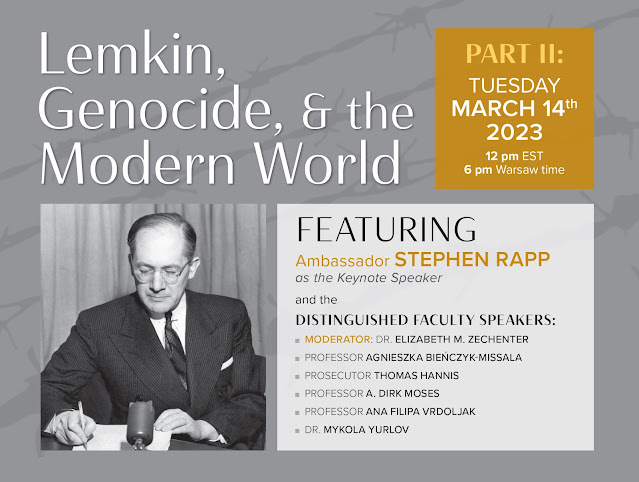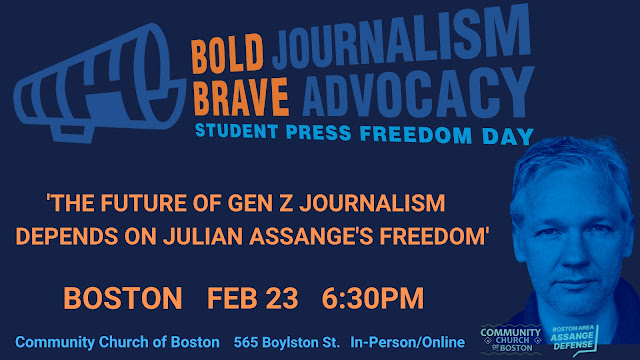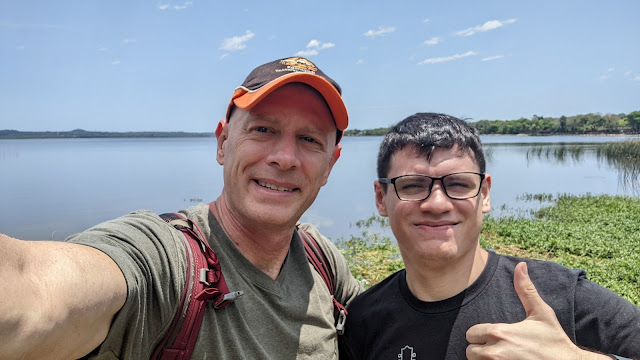In fall 2022, students in my freedom-of-information (FOI) law seminar produced another range of compelling research papers in which they inquired into hot issues in the law of access to government.
It's been my privilege to teach a law school seminar in FOI since 2004. For other teachers who might like to include FOI in the higher ed curriculum, my 2012 casebook and companion teaching notes are now available in full on my SSRN page. Please contact me if my contemporary syllabus or other materials can be of help. I teach the law of access broadly, from state law to federal, and in all branches of government. Students moreover are encouraged to pursue research projects in any vein of transparency and accountability, including access to the private sector, which has been a focus in my research, too.In fall 2022, my students had the fabulous opportunity to participate contemporaneously in the online National FOI Summit of the National Freedom of Information Coalition (NFOIC). I'm grateful to NFOIC President David Cuillier and Summit Organizer Erika Benton for making our participation possible.
My fall class was joined by a number of guest speakers who vastly enhanced students' exposure to FOI law, research, and practice. I am especially grateful to Professor Alasdair Roberts, UMass Amherst, who joined us live to talk about all things FOI, from his classic book Blacked Out (Cambridge 2012) to the implications for transparency and accountability of the research in his latest book, Superstates (Wiley 2022).
I thank Professor Robert Steinbuch, Arkansas Little Rock, who joined us to discuss his tireless work as an advocate in the legislature for transparency. He now writes powerfully about transparency and accountability as a regular columnist for The Arkansas Democrat-Gazette, and he is author of the treatise, The Arkansas Freedom of Information Act (LexisNexis 8th ed. 2022). I thank Professor Margaret Kwoka, Ohio State, who took time away from her ongoing FOI research in Mexico to join us to talk about that work and her recent book, Saving the Freedom of Information Act (Cambridge 2021).
I also thank attorney Alyssa Petroff and current law student Megan Winkeler, who joined us via Zoom to talk about their FOI research. An alumna of my FOI seminar (as well as Comparative Law) and now a judicial law clerk for the Maine Supreme Court, Petroff discussed her recent article in The Journal of Civic Information on access to information about private prisons in Arizona. An alumna of my 1L Torts classes, Winkeler has four years' experience in negotiation and mediation training and currently is researching negotiated rule-making in administrative law.
Here are the students' ambitious projects.
Madison Boudreau, The Benefits and Drawbacks of Reform Targeting Police Misconduct. The movement to increase public access to police misconduct and disciplinary records has proven to be a beneficial and necessary step toward heightened transparency and accountability of police departments and officers. However, states that have taken strides to open up access to these records continue to grapple with the ongoing barriers to public access despite their efforts. States seeking to implement similar changes to their open records laws will benefit by remaining aware of potential drawbacks to access despite reform. In the absence of impactful reform that effectively mandates the disclosure of these records, police departments have shown to prefer to remain under a cover of darkness, their internal personnel procedures left unchecked. As a result, the cycle of police secrecy is bound to viciously repeat itself.
Aaron Druyvestein, The Rise of Vexatious Requester Laws: Useful Regulation or Evasive Government Practice? The concept of freedom of information allows anyone to request any agency record for any reason, a model that has been replicated around the world and celebrated as a necessity for promoting democracy. The underlying goals of FOI to promote accountability are contingent on the government providing a strong and efficient FOI system. However, with the dramatic increase in FOI requests in the country, brought about in large part by better utilization of technology in FOI processes, there has been an increase in the burden on administrative agencies as a result of excessive, repetitive, or vindictive FOIA requests. Since 2010, governments' responses to these burdensome requests have resulted in the creation of so-called vexatious requester laws, which are intended to mitigate the effect of these requests on agencies.
Critics of vexatious requester laws argue that the laws are nothing more than a feeble attempt by the government to undermine otherwise valid records requests under the guise of improving government efficiency and reducing requester harassment. Concerns have been expressed that the laws' reliance on ambiguous terminology such as "vexatiousness" will give agencies discretion to deny requests based on subjective and unverifiable agency determinations of the requester's intent or motives for requesting. This paper analyzes the rise and application of vexatious requester laws as seen in the three states—Illinois, Connecticut, and Kentucky—that have passed statutory provisions permitting administrative agencies to deny requests to vexatious requesters. In addition, this paper investigates the policy implications of such laws on the broader FOIA system.
Alise Greco, Read It Before You Eat It: An Explicatory Review of the 2016 Nutrition Facts Label and Balancing FDA Transparency with Consumer Comprehension and the Food Industry. As the nation recovers from the COVID-19 pandemic, it is difficult to ignore how drastically the American lifestyle has changed, especially with regard to diet and exercise. The Nutrition Facts Label (NFL), largely meant to influence and assist consumer decision-making for food and beverages, was last updated by the U.S. Food and Drug Administration (FDA) in 2016. This paper explains the 2016 NFL regulation in greater detail in light of a current need by many Americans to make informed, healthier choices based on science rather than social media or misleading, corporate-designed packaging. The FDA is put under the microscope and evaluated on its ability to balance the needs of consumers to be provided transparent, useful information and the demands from industry to make a profit.
Nicholas Hansen, Only Those Who Count The Vote Matter: A Comparative Examination of Arizona and Federal Transparency Regulations Pertaining to Election Data and Procedure and Their Impact on Citizen Confidence in Democracy. This analysis details the protections afforded under the state of Arizona’s election data exemptions under both the Arizona Open Meetings Act and the Arizona Open Records Act, and provides comparisons to the protections afforded under similar exemptions provided at the federal level. Characterizations of the election data and procedural protections for both levels of government are offered, and examinations of what information is permitted for provision under FOIA requests substantiate these characterizations. This analysis proceeds with an understanding that examinations must be confined to information that is both the subject of and relevant to either historical or ongoing FOIA requests, rather than the information made available to the public through the procedures associated with courtroom disclosures.
This author posits that Arizona’s trend toward enforcing relative transparency when courts are compelled to examine the efficacy and validity of local election procedures might serve as a model for states whose courts are less inclined toward making such information available to the public at large. Recent lawsuits, including those associated with the largely settled controversies alleged pertaining to the 2020 Presidential election, and those suits pertaining to the use of Dominion Voting System’s voting machines substantiate this advocacy.
This analysis concludes with a determination as to whether or not Arizona’s FOIA exemptions as they pertain to election data and procedural information inspire greater public confidence than those utilized at the federal level. Also offered are policy recommendations as to how the Arizona judiciary might be able to better handle future election data and procedural controversies by utilizing the already extant tools within the FOIA rules, as well as policy recommendations for legislative reform in other states and the federal level, should local legislators and Congress see fit to implement a more transparent, more accessible system of legal procedures to deal with future election controversies.Mitchell Johnson, Transparency and Tragedy: How the Texas Public Information Act is Being Weaponized After Uvalde, Yet Can Be Used for Good. This comment examines the Texas "law enforcement exception" under the Texas Public Information Act (PIA) regarding the mandamus lawsuit that several media outlets filed to obtain records from the Department of Public Safety (DPS) after the Robb Elementary shooting on May 24, 2022. The paper focused on the DPS, and not on another law enforcement agency at the scene of the shooting on May 24, because of the actions of Colonel Steven McCraw. Colonel McCraw, the highest ranking official in the DPS, has provided inconsistent accounts to the public of what occurred on May 24. This comment also examines the specific exceptions that the DPS claims. The DPS claims that the records that are sought for disclosure are either (1) records relating to an active investigation, or (2) records that relate to the purposes of law enforcement. The DPS’s current utilization of these exceptions is not grounded in law. No criminal investigation is taking place because the shooter is deceased. Furthermore, while Colonel McCraw has stated that his agency is reviewing his troopers’ and rangers’ actions to determine whether there should be a referral to prosecutors, criminal charges might be futile because of governmental immunity. Also, many of the records requested pertain to "basic information" of a crime that must be disclosed under the PIA. Last, the comment proposes that the PIA should be amended to incorporate case law and create a "criminality showing" if a law enforcement agency wishes to withhold documents under an active investigation exception.
Ashley Martinez-Sanchez, The New Jersey Open Public Records Act and the Public Interest in a Narrow Statutory Interpretation of the "Criminal Investigatory" Exemption. The New Jersey Open Public Records Act (OPRA) expresses a strong public policy in favor of open and transparent government. OPRA champions the idea of a citizen's right of access to government records to ensure an informed public. However, transparency is not absolute. The OPRA permits secrecy for ongoing law enforcement investigations. Courts should narrowly read the "criminal investigatory" exemption. This paper analyzes the evolution of the exemption over the years. It further examines what the future looks like for it in the legislative and judicial context. I reference New Jersey case law and recent events in the state to contextualize the importance of narrowly reading the exemption. Inversely, the paper suggests that a narrow interpretation of the exemption not only would impede transparency efforts, but would raise civil rights concerns, particularly for marginalized and vulnerable communities in New Jersey.
Marikate Reese, Police Accountability: Does it Really Exist? This paper demonstrates the power of police unions, and their contracts, in limiting accountability, transparency, and access. The contracts are the catalyst to shielding officers from disciplinary actions, limiting civilian oversight, and restricting access to misconduct records. While states, such as New York, have become more transparent with their records, the unions still dictate a large part of police procedure. This procedure includes, but is not limited to, delay of officer interrogations, obstructing investigations of misconduct, and destroying disciplinary records. The procedures are safeguards put in place by collective bargaining practices, law enforcement bills of rights, and civil labor law protections. The overall purpose of these safeguards is to establish rights, protections, and provisions for law enforcement officers including the arbitration process, training standards, and process of investigation. This paper provides a brief coverage of the protections afforded by collective bargaining, police bills of rights, and civil labor laws that stand in the way of the public transparency barriers and racial injustice. Furthermore, this paper addresses how these procedural protections limit accountability while taking a look at the existing laws among various states. This paper suggests several ways states have made strides for accountability and what limitations might arise as a result.
James Stark, What's the Deal with Doxing? Doxing is an entropic issue plaguing today’s society. Defining what it means to be “doxed” has been a problem that’s compounded by the fact that not all forms of doxing are equal. Some play a useful role in public discourse, while other forms of doxing enable harassment of private citizens. The current anti-doxing laws can be summed up in three categories. First are the “incidentals,” which tend be older laws that just incidentally happen to address doxing in some way due to the language used. The second category is “Daniel’s Law,” which is a law that has picked up traction for trying to protect public officials from doxing and its harms. Lastly are the “general” statutes, which were crafted to specifically fight doxing in general and protect as many people as possible from doxing. In order to properly combat doxing, legislatures need to agree that doxing is the unwanted release of personal or identifying information about an individual as a form of punishment or revenge, and that it can affect anyone, in government or not. The legislatures must focus on creating “general” statutes, and tailor the laws to protect the individuals, while allowing discourse around public officials. A poorly written anti-doxing law will result in either censorship or inadequate protection of individual Americans.
 | |
| Marco Verch Professional Photographer via Flickr CC BY 2.0 |















_logo.png)
.jpg)




.jpg)



